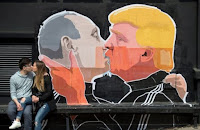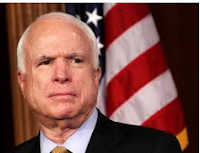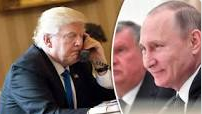 The scarlet thread of Maidan continues to weave itself into the current political upheavals in the US.
The scarlet thread of Maidan continues to weave itself into the current political upheavals in the US.Putin's gamble that getting Trump elected President of the US would finally unshackle himself from the US-EU sanctions imposed upon himself, his 'siloviki' clan in the Kremlin, and the failing Russian economy, following Putin's invasion and annexation of Ukrainian Crimea, and his invasion of eastern Ukraine (Donbas), is beginning to unravel very fast.
Following hot on the heels of the resignation of Michael Flynn, Trump's National Security Adviser who promised Putin's ambassador to the US, Sergei Kislyak, that those sanctions would soon disappear, we now have US Attorney General Jeff Sessions being forced to recuse himself from a Senate and House of Congress investigation into the connections between Trump's White House appointees and Putin himself. (above: Flynn, Kislyak, and Sessions)
Questioned about his meetings with Kislyak both during the US election campaign, and after Trump was elected, Sessions responded,
"He said he had spoken with the Russian ambassador as a US senator and not as Mr Trump's "surrogate".
...
He said: "I never had meetings with Russian operatives or Russian intermediaries about the Trump campaign."
Mr Sessions said that during his meeting with Mr Kislyak they talked about terrorism and then "somehow the subject of Ukraine came up". (BBC News : 3 March 2017) (my emphasis)
As this direct link between Putin's Kremlin and US President Donal Trump continues to unravel, Germany, France, and Holland anxiously approach critical elections.
The call by Putin's 'friends' in the EU for sanctions against Russia to be lifted grows ever more strident.
As reported by Andrew J Barden, Boris Groendahl , and Jonathan Tirone,
 "Austrian Chancellor Christian Kern called for a rethink on sanctions
imposed on Russia, saying that the regime of penalties over
Kremlin-backed incursions in Ukraine has failed to yield enough
progress." (Bloomberg : 23 February 2017) (my emphasis)
"Austrian Chancellor Christian Kern called for a rethink on sanctions
imposed on Russia, saying that the regime of penalties over
Kremlin-backed incursions in Ukraine has failed to yield enough
progress." (Bloomberg : 23 February 2017) (my emphasis)Even Merkel's optimism about reaching even a modicum of success in getting Minsk2 off the ground seems to be fading.
 "“We cannot give up on the principle of territorial integrity,” Merkel
told the annual Munich Security Conference on Saturday. “We owe that not
only to Ukraine, but to many other countries and to ourselves.” A
political solution is needed “and I’m ready to devote a lot of time and
energy to this, and to keep working at it even in the face of
disappointments,” she said." (Alan Crawford : Bloomberg : 19 February 2017) (my emphasis)
"“We cannot give up on the principle of territorial integrity,” Merkel
told the annual Munich Security Conference on Saturday. “We owe that not
only to Ukraine, but to many other countries and to ourselves.” A
political solution is needed “and I’m ready to devote a lot of time and
energy to this, and to keep working at it even in the face of
disappointments,” she said." (Alan Crawford : Bloomberg : 19 February 2017) (my emphasis)Political storm clouds are descending not only upon Donald Trump, but also upon the EU.
Putin's initial euphoria when he invaded and annexed Ukrainian Crimea, started his war with Ukraine in the Donbas, and got Donald Trump elected President of the US, is also fading fast.
His 'bromance' with Trump is heading for a rather speedy divorce.
And throughout all of this, the scarlet thread of Maidan continues to weave itself.
(to be continued)








































